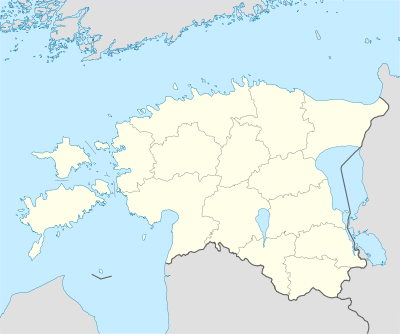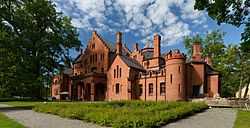Sangaste
| Sangaste | |
|---|---|
| Small borough | |
|
Sangaste castle | |
 Sangaste Location in Estonia | |
| Coordinates: 57°55′34″N 26°19′55″E / 57.92611°N 26.33194°ECoordinates: 57°55′34″N 26°19′55″E / 57.92611°N 26.33194°E | |
| Country | Estonia |
| County |
|
| Municipality |
|
| Population (01.01.2010[1]) | |
| • Total | 228 |
Sangaste (Võro: Sangastõ) is a small borough (Estonian: alevik) in Valga County, southern Estonia. It is the administrative centre of Sangaste Parish. Sangaste has a population of 228 (as of 1 January 2010).[1]
Sangaste castle
Sangaste castle (German: Schloss Sagnitz) traces its history to at least 1522, when it was part of the estates of the bishop of Tartu. The current building was built in 1879-1883 and designed by architect Otto Pius Hippius. It is built in a neo-Gothic style with influences from Tudor architecture, and considered one of the most impressive examples of Gothic Revival architecture in the Baltic States. Several original interior details have been preserved to this day. The manor house was unusually modern for its time, equipped with central heating, telephones in 1896, and electric light in 1907.[2][3]
According to legend, it owes its existence to an insult the local count Friedrich Georg Magnus von Berg received in his youth. When attempting to wed a young English lady, her father objected to giving his daughter away to "some Russian savage".[4] Nowadays the castle is administratively located in the nearby Lossiküla village.
Gallery
-

Sangaste castle
-

Sangaste castle
-

Sangaste church
Notable people
- Friedrich Wilhelm Rembert von Berg (1793–1874), Russian Field Marshal, and the Governor-General of Finland; was born in Sangaste Castle
- August Gailit (1891–1960), writer; was born in Kuiksilla, near the Sangaste Castle
- Aarne Viisimaa (1898–1989), operatic tenor and opera director
References
- ↑ 1.0 1.1 "Rahvastik" (in Estonian). Sangaste vald. Retrieved 8 March 2010.
- ↑ Sakk, Ivar (2004). Estonian Manors - A Travelogue. Tallinn: Sakk & Sakk OÜ. pp. 254–256. ISBN 9949-10-117-4.
- ↑ Hein, Ants (2009). Eesti Mõisad - Herrenhäuser in Estland - Estonian Manor Houses. Tallinn: Tänapäev. p. 231. ISBN 978-9985-62-765-5.
- ↑ "Sangaste Castle". Retrieved 26 May 2010.
External links
- Sangaste Parish (Estonian)
- Sangaste Castle
| Previous station | |
Next station |
| |
|
Valga |
| Wikimedia Commons has media related to Sangaste. |
| ||||||||||||
| ||||||||||||||||||||||||||||||||||||||||||||||||||||||||||||||||||

